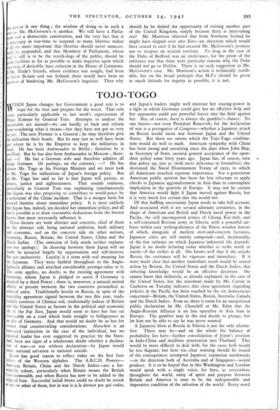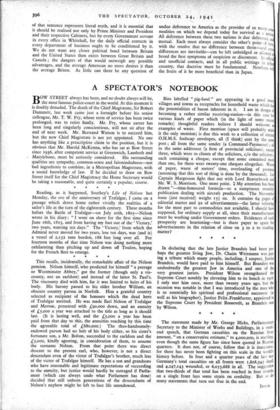TOJO-TOGO
HEN Japan changes her Government a good rule is to hope for the best and prepare for the worst. That rule seems particularly applicable to last week's supersession of Prince Konoye by General Tojo. Attempts to analyse the inscrutable are natural—we can hardly sit back and refrain tom wondering what it means—but they have not got us very far yet. The new Premier is a General ; he may therefore give the militarists their heads. But he may just as well have been put where he is by the Emperor to keep the militarists in hand. He has been Ambassador in Berlin ; therefore he is pro-Nazi. But he has also been Ambassador in Moscow ; there- fore —? He has a German wife and therefore admires all things German. Or perhaps, on the contrary, —? He has chosen Mr. Togo as his Foreign Minister and we must look to Mr. Togo for indications of Japan's foreign policy. But all Mr. Togo has said so far is that Japan will pursue, as always, justice and righteousness. That sounds ominous, particularly as General Tojo was explaining simultaneously that Japan was also proposing to contribute to world-peace by a settlement of the aline incident. That is a meagre basis for assured theories about immediate policy. It is most unlikely that Japan has, indeed, yet decided her immediate policy, and all that is possible is to draw reasonable deductions from the known factors that must necessarily influence it.
Those factors are both abstract and concrete, chief of them on the abstract side being national ambition, both military and economic, and on the concrete side six other nations, Germany, Russia, Britain, the United States, China and the Dutch Indies. (The omission of Italy needs neither explana- tion nor apology.) In choosing between them Japan will no doubt be actuated largely by opportunism and self-interest. But not exclusively. Loyalty is a term with real meaning for the Japanese. They were faithful throughout to the Anglo- Japanese alliance and attached considerable prestige-value to it. The same applies, no doubt, to the existing agreement with Germany, whom Japan is pledged to assist if Germany is attacked by a third Power ; there is, moreover, a natural mental affinity at present between the two countries personified as political units. Traditionally hostile to Russia, in spite of the neutrality agreement signed between the two this year, tradi- tionally covetous of Chinese soil, traditionally jealous of Britain and the United States as factors in the political and economic life of the Far East, Japan would seem to have her feet set irrevocably on a road which leads straight to belligerence as an ally of Germany. And that would no doubt be so but for certain vital countervailing considerations. Hara-kiri is an honoured institution in the case of the individual, but no national leader has ever suggested its practice by the State. And there are signs of a wholesome doubt whether a declara- tion of war—or war without declaration—by Japan would mean national salvation or national suicide.
Japan has good reason to reflect today on the first four letters of the Western alphabet. The A.B.C.D. Powers— America, Britain, China and the Dutch Indies—are a for- midable cohort, particularly when Britain means the British Commonwealth, and when Russia has now to be added to the original four. Successful 'initial blows could no doubt be struck at one or other of them, but in war it is le dernier pas qui coilte, and Japan's leaders might well mistrust her staying-power in a fight in which Germany could give her no effective help and her opponents could put powerful forces into the field against her. But, of course, there is always the gambler's chance. No one knows—not even President Roosevelt, for the declaration of war is a prerogative of Congress—whether a Japanese attack on Russia would mean war between Japan and the United States. But there are omens which the Tojo-Togo combina- tion would do well to mark. American sympathy with China has been strong and unvarying since the days when John Hay, as Secretary of State, secured general acceptance of the open- door policy some forty years ago. Japan has, of course, torn that policy up, just as (with more deference to formalities) she destroyed the Naval Disarmament Treaty of 1922, to which all Americans attached supreme importance. For a generation American public opinion has been far less reluctant to apply checks to Japanese aggrandisement in Asia than to contemplate implication in the quarrels of Europe. It may not be certain that America would fight if Japan moved against Russia, but it is very much less certain that she would not.
Of that baffling uncertainty Japan needs to take full account. And associated with it are several adamant certainties, in the shape of American and British and Dutch naval power in the Pacific, the still unconquered armies of Chiang Kai-shek, and a self-contained Russian .army in Siberia, with a powerful air- force within easy striking-distance of the flimsy wooden houses of which, alongside of modern steel-and-concrete factories, Japanese cities are still mainly composed—and, incidentally, of the few railways on which Japanese industrial life depends. Japan is no doubt debating today whether to strike north or south—if she strikes at all. She knows well that if she attacks Russia the resistance will be vigorous and immediate. If it were made clear that another immediate result would be armed action by Britain, the United States and the Dutch Indies, that sobering knowledge would be an effective deterrent. She cannot know that definitely, as already explained, in the case of the United States, but the statement made by Mr. Curtin in Canberra on Tuesday indicates that close agreement regarding policies in the Pacific has been reached by the six democracies concerned—Britain, the United States, Russia, Australia, Canada and the Dutch Indies. Even so, there is room for an unequivocal public declaration by Mr. Churchill or Mr. Eden that the Anglo-Russian Alliance is no less operative in Asia than in Europe. The gambler may in the end decide to plunge, but let him not be able to say he was never warned.
A Japanese blow at Russia in Siberia is not the only alterna- tive. There may be—and on the whole the balance of probability lies here—further consolidation of Japan's position in Indo-China and insidious penetration into Thailand. This would be more difficult to deal with, for the casus belli would be less flagrant, but here too clear warning should be issued of the consequences attempted Japanese expansion southwards —in the direction both of Australia and of Singapore—would produce. It is to be hoped that in this Washington and London would speak with a _single voice, for here, as everywhere throughout the world, unity of spirit and purpose between Britain and America is seen to be the indispensable and imperative condition of the salvation of the world. Every word of that sentence represents literal truth, and it is essential that it should be realised not only by Prime Minister and President and their respective Cabinets, but by every Government servant in every office in Whitehall, for the daily official contacts in every department of business ought to be conditioned by it. We do not want any closer political bond between Britain and the United States than exists between Great Britain and Canada ; the dangers of that would outweigh any possible advantages, and the average American no more desires it than the average Briton. As little can there be any question of undue deference to America as the provider of so many corn, modifies on which we depend today for survival as a nanort All deference between these two nations is due deference, and mutual. Each must always consider the other's point of view, with the resolve that no difference between them-L-and so,, differences are inevitable—can be left unbridged or allowed „ breed the first symptoms of suspicion or discontent. In official and unofficial contacts, and in all public writings in either country, that doctrine must be fundamental. Nowhere Al the fruits of it be more beneficial than in Japan.



























 Previous page
Previous page